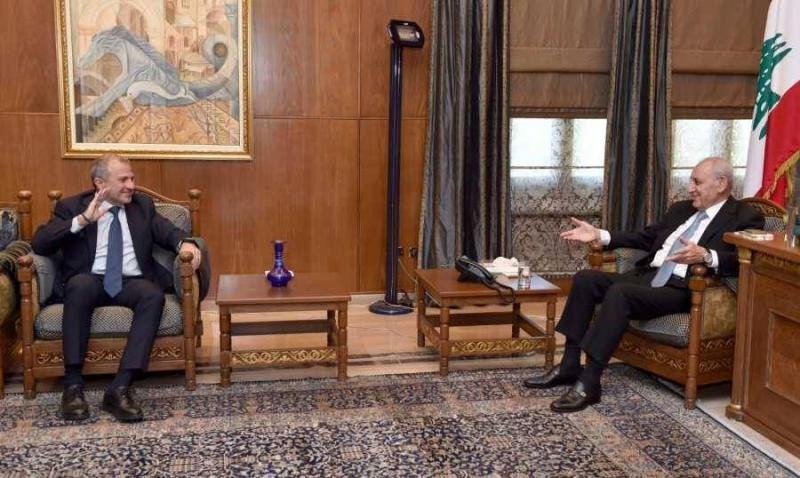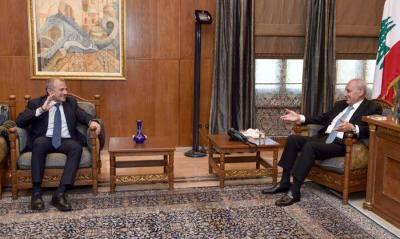In the midst of unprecedented southern escalation, diplomatic activity in Lebanon has been described as "American days," highlighted by a meeting with a delegation from the U.S. Congress' Committee on Foreign Relations, which included Senator Richard Blumenthal and Senator Christopher Coons, and the anticipated arrival of Ambassador David Hale early next month in Beirut. The visit aims to find diplomatic solutions to Lebanese crises, including disputes over the situation in the south and the presidential vacancy, framed by a new perspective on Lebanon's situation, aligned with a memorandum sent to President Joe Biden's administration emphasizing the need for a new management approach in foreign policy towards Lebanon. This approach seeks to empower quiet diplomacy to resolve the Lebanese impasse, distancing it from external political rhetoric.
According to Hale, who is well-acquainted with Lebanon, the appointment of a new U.S. ambassador in Beirut coincides with a new management style in U.S. foreign policy in Lebanon. It is important to note, however, that policies are crafted in Washington, not within embassies. As skilled diplomat Lisa Johnson prepares to move to Lebanon, it is time to think about how to orient the Washington team for her tasks in Lebanon.
A congressional delegation, alongside Ambassador Johnson, discussed developments and potential solutions during meetings with prominent figures, including Presidents Nabih Berri (in Ain El-Tineh) and Najib Mikati (in his residence), Minister Abdullah Bou Habib (at the Foreign Ministry), and Army Commander General Joseph Aoun, focusing on supporting the Lebanese Army, its role, and its capacity to implement Resolution 1701.
In New York, Lebanon's mission at the United Nations is actively confronting Israeli threats regarding its purported intention to enforce Resolution 1701 by force in the coming weeks. They emphasize that Israel is the one violating Resolution 1701, with documented breaches exceeding 30,000 since 2006, resulting in the deaths of dozens of civilians and the displacement of tens of thousands.
According to a Lebanese diplomatic source in New York, Lebanon supports the full implementation of Resolution 1701 and is ready to negotiate, with American mediator Amos Hochstein, supported by the UK and France, facilitating discussions. Hochstein has proposed an incomplete framework regarding border disputes, and it appears that the U.S. administration has not yet developed a comprehensive initiative. No one is prepared to discuss any initiative before halting hostilities on Gaza.
Thus, the southern and presidential situations appear interconnected, dependent on negotiations ongoing amidst the war in Gaza. A prominent leader in the Shiite duo has expressed that the presidential vacancy could extend for a long time, with no one knowing when a president will be elected. Regarding the five-party initiative and discussions of electing a president before Eid al-Fitr, the leader stated that no complete initiative has reached any Lebanese party, and they have been trapped in this discourse for some time, while all facts indicate no premises exist for a presidential election at present from either the five-party committee or Lebanese parties.
The leader questioned the speculation surrounding MP Gibran Bassil's potential agreement to dialogue, wondering how such discussions would proceed if Bassil insists on rejecting Franjieh while the duo is steadfast in supporting him.
Informed political circles believe, according to "The Tribune," that there are no new presidential initiatives even under discussion, as the aim is to renew activism without anticipating any progress on the presidential file in the near term. There will also be no expected outcomes before commencing consultations on the foundations underpinning this entitlement and the candidates involved to avoid repeating the failures seen in previous attempts.
These circles noted that the stances of leaders during their meetings with ambassadors from the five-party committee provide clarity on whether to push for new momentum or to stall progress, anticipating a freeze on any expected steps due to the southern file and ongoing diplomatic efforts. It is also indicated that the recent position of the Free Patriotic Movement might impact the course of the presidential file and that clarity will emerge in the coming days.
It is noteworthy that sources from the Free Patriotic Movement speak of a forthcoming move by Bassil towards Ain El-Tineh to negotiate an agreement on mechanisms for initiating dialogue between blocs ahead of a series of electoral sessions. According to "The Tribune," parliamentary sources reveal that the Shiite duo is urging Bassil to reconsider his rejection of Franjieh’s candidacy if he wants the proposed dialogue agenda to have a chance of success. Following the five-party committee's meeting, French Ambassador Hervé Magro was briefed on the information regarding mediator Jean-Yves Le Drian's efforts in Egypt and Saudi Arabia, aimed at facilitating the election of a new president and discussing how the committee operates before his arrival in Beirut.




